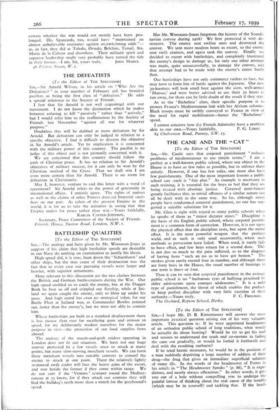THE CANE AND THE CAT "
[To the Editor of THE SPECTATOR] Sut,—Mr. Castle says that corporal punishment " reduces problems of misdemeanour to too simple terms." I am a prefect at a well-known public school, where our object in the House is to have as few rules as possible, but to enforce them strictly. However, if one has few rules, one must also have few punishments. One of the most important lessons a public school can each is " fair play." As example is necessary in such training, it is essential for the boys to feel that they are being treated with absolute justice. Corporal punishment greatly facilitates this, as trivial offences of a similar nature can all be dealt with in the same way. So far, although many- people have condemned corporal punishment, no one has sug- gested a suitable substitute for it.
Mr. Glen is right with regard to many public schools when he speaks of them as "minor dictator states." Discipline is the basis of the English public school, where corporal punish- ment is a common form of correction. However, it is not upon the physical effect that the discipline rests, but upon the moral effect. It is the most powerful weapon that the prefects wield, and as such is only used occasionally, when such methods as persuasion have failed. When used, it rarely fails to have effect, and few boys return for a second dose. This is not due so much to the pain inflicted, as to the disgrace of having been " such an ass as to have got beaten." The strokes given rarely exceed four in number, and although there are forty boys in the House, the usual number of beatings in one term is three or four.
Thus it can be seen that corporal punishment in the average public school is no " barbarous type of bullying practised by older adolescents upon younger adolescents." It is a mild type of punishment, the threat of which enables the prefects to keep perfect discipline with very little exertion of their authority.—Yours truly, F. C. FREEMAN. The Orchard, Repton School, Derby.










































 Previous page
Previous page